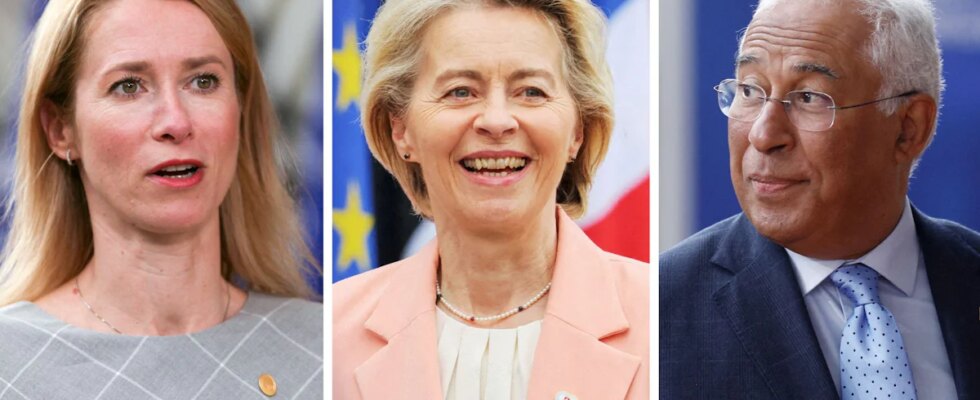Chancellor Olaf Scholz announced a “quick and speedy” solution. He used these words several times when the SPD man arrived in Brussels early on Monday evening for the informal summit of heads of state and government. It seemed to be only a matter of a few hours before the EU’s highest body would pave the way for Ursula von der Leyen to serve a second term as Commission President. But it turned out to be a very long evening, and at the end of the discussions the result was: nothing. At least nothing concrete.
Ursula von der Leyen was invited to the meeting and was able to present some thoughts on the future of the European Union. But there was no agreement on the personnel table that had been prepared in recent days and weeks. “There is no agreement today,” said the current Council President Charles Michel when he appeared before the media around midnight. And that was no surprise, he added. They had only agreed to have an initial exchange of views on the result of the European elections.
However, this was only partially true. The European People’s Party (EPP), the Social Democrats and the Liberals had previously agreed on a personnel table that apparently only needed to be approved.
It stipulated that the EPP, led by CSU politician Manfred Weber, would be allowed to head the EU Commission. With Ursula von der Leyen as its lead candidate, it had emerged as the clear winner of the European elections and had made a decision: the CDU politician should lead the EU executive for another five years.
Social Democrats to appoint the Council President, Liberals the Foreign Affairs Representative
According to the provisional agreement, the Social Democrats will be able to choose who will succeed Belgian Charles Michel as President of the Council. His task is to coordinate and chair the summit meetings of heads of state and government. The choice should fall on the former Portuguese Prime Minister António Costa. The post of High Representative for Foreign Affairs and Security Policy would go to the Liberals; the first candidate to succeed Spaniard Josep Borrell is Estonian Prime Minister Kaja Kallas. There also seemed to be agreement that the EPP, in the person of Roberta Metsola, should retain the post of President of the Parliament. However, she is not part of the personnel table discussed on Monday.
At first there was only speculation as to why no agreement was reached. The EPP had obviously gambled very high. The Polish Prime Minister Donald Tusk, acting as the EPP’s negotiator, expressed concerns about António Costa and demanded clarification as to whether he was really not involved in a corruption case that was underway in Portugal. The Croatian Prime Minister Andrej Plenković presented the EPP’s wish that the Social Democrat should only be nominated as Council President for two and a half years, i.e. for half of the coming legislative period. The second half should go to an EPP candidate. The Social Democrats rejected this, and Olaf Scholz and the Spanish Prime Minister Pedro Sánchez acted as their negotiators.
:The Green Deal gives a sign of life
Unexpectedly, the law to restore nature has found a majority in the EU. This is thanks to an Austrian minister.
After the meeting, Plenković said that the EPP’s election victory must be taken into account when allocating posts. His party will not deviate from this. No doubts about Ursula von der Leyen were raised at the dinner.
Official summit at the end of June
The heads of state and government will meet for an official summit on June 27 and 28. When asked whether there was at least a majority in favor of the agreed personnel table, Charles Michel replied that he could not judge that. But given the many crisis areas in Europe and the world, it is urgently necessary to clarify the open questions in June. The European Parliament could then vote on von der Leyen in mid-July. She is fundamentally counting on a majority in Parliament made up of the EPP, Social Democrats and Liberals. This alliance should be reflected in the filling of the top jobs.
The European treaties stipulate that the heads of state and government, as the highest body in the EU, nominate a person to chair the Commission. The prerequisite for this is a “reinforced qualified majority”, which means that at least 72 percent of the 27 heads of state and government must vote for von der Leyen, and they must represent at least 65 percent of the total population of the EU. The EPP has 12 of the 27 heads of state and government, so it needs at least eight supporters.
In the European Parliament, Ursula von der Leyen must be elected by at least 361 of the 720 members. The EPP, Social Democrats and Liberals have just over 400 seats, which is not considered a particularly stable majority in the European Parliament. Olaf Scholz stressed again on Monday that the future top EU personnel and their program should also be supported in Parliament by the three-way alliance of the EPP, Social Democrats and Liberals. The Commission Presidency must under no circumstances be based on “right-wing and right-wing populist parties”. He was referring in particular to Giorgia Meloni’s Fratelli d’Italia, with whom many EPP leaders would rather work than with the Greens, for example.
It remained unclear on Monday whether Giorgia Meloni would support a second term for Ursula von der Leyen. She will probably insist that her government be allowed to nominate a commissioner with a prominent position. Meloni’s party, the Fratelli d’Italia, belongs to the “European Conservatives and Reformists” (ECR) group in Parliament and claims to be part of the governing majority. The Greens have also offered to cooperate with von der Leyen – but on the condition that the EPP does not work with Fratelli.

